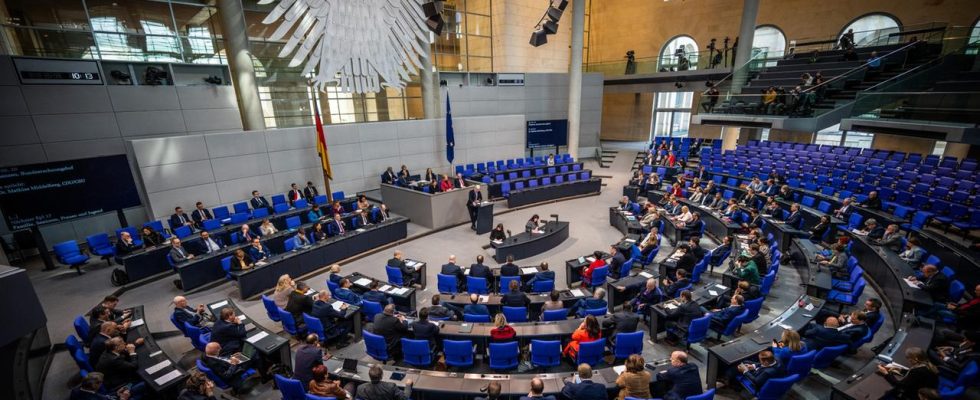A team of researchers examined how understandable speeches in the Bundestag are. At the top of the ranking: a federal minister, at the very back: also representatives of the government parties.
The news comes as a surprise to Bettina Stark-Watzinger. “I’m terribly proud of it,” said the Federal Minister of Education happily in an interview with ARD capital studio.
Stark-Watzinger gave the most understandable speech in the Bundestag during budget week. This is the conclusion reached by a research team from the University of Stuttgart-Hohenheim. The communication scientists analyzed 96 speeches from the budget debate last September.
It wasn’t about whether the content of the speeches was understandable, but rather about formal criteria such as: short sentences, few foreign and technical words and anglicisms. This is exactly what the researchers noticed when Federal Finance Minister Christian Lindner talked about “turnaround potential”.
Or with Federal Economics Minister Robert Habeck, who included the term “incentivized” in his speech. Bettina Stark-Watzinger did not use such or similar terms and therefore achieved 19.2 out of 20 points in the so-called Hohenheim comprehensibility index.
Lindner and Habeck attract negative attention with their technical terms
“I’ll say at home: Why don’t you understand me? After all, people understand me in the Bundestag,” says the minister with a laugh.
Your strategy for a good speech in the Bundestag: express complex connections in such a way that people understand them. Short and sweet, preferably with images and metaphors, explains the FDP politician. You have to put aside the belief that it seems particularly clever if you speak long tapeworm sentences. Then no one understands you, said the minister.
Education Minister Bettina Stark-Watzinger gave the most understandable speech during budget week.
The Greens and FDP bring up the rear
Agnieszka Brugger from the Greens and Claudia Raffelhüschen from the FDP, on the other hand, find it difficult to use simple sentences in their Bundestag speeches. They only got 8.0 out of 20 points in the study and therefore gave the most incomprehensible speeches.
“Formally they are a bit more complicated,” says communications scientist Claudia Thoms from the University of Hohenheim. According to their analysis, the sentences of the last two placed are on average twice as long as the sentences of the winner Stark-Watzinger.
If you listen to the budget speeches from the fall – available in the Bundestag media library – even clearer differences become apparent. Brugger, for example, said: “As members of the democratic factions on the Defense Committee, we know that we are creating large gaps in the Bundeswehr’s already inadequate equipment, which is affecting it, especially in exercises and training.” 29 words.
The Education Minister’s speech, on the other hand, began like this: “Those who travel to researchers are traveling into the future.” Eight words.
Environment Minister is a loser in the cabinet
Environment Minister Steffi Lemke performed worst among the members of the federal cabinet. Chancellor Olaf Scholz still manages to achieve a value of 14.3.
His rival, CDU leader Friedrich Merz, is just behind him with 13 points. His budget speech was therefore a little more incomprehensible.
Communications scientist Thoms gives all MPs these tips for a comprehensible Bundestag speech: “A choice of words that is adapted to my target group. Maybe also an active language instead of a passive one. So say too clearly: Who is responsible for something now.”
So no empty phrases and no technical jargon. But even if it does creep into the text, if you still deliver the speech well, you can save a lot, says the expert.
Oliver Neuroth, ARD Berlin, tagesschau, March 7, 2024 5:21 p.m

